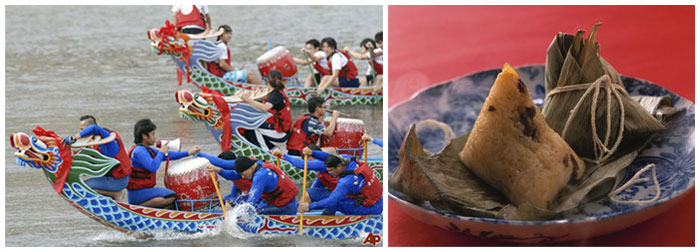| Dragon Boat Festival |

|

|

|
| Culture | |
| Tuesday, 15 June 2010 | |
|
My earliest memories of Duanwu Jie, or Dragon Boat Festival, consist of helping my grandmother and aunts wrap the pyramid-shaped sticky rice dumplings without which the celebration would be incomplete. The matron of the household, my grandmother was the only person who could stew the pork; the stoves became a no-go zone for my aunts and me, who were given the responsibility for washing what seemed like endless pots of sticky rice and wrapping them in fragrant banana leaves. The fist-sized dumplings – filled with the pork stewed in soya sauce and other special Asian spices – are then steamed in batches over hours. For a couple of weeks every year in June, it seemed these dumplings were all we ate. We didn’t complain; the wafting smell of freshly-made dumplings was heavenly, and there was nothing else like it. And of course, there were the boat races. The echoes of pulsating, steady drum beats was so exciting to me when I was a kid, and there’s no denying the appeal that the rhythmic sounds still hold for me, and other adults. There is something so primal, so basic about drums, they are after all among the first musical instruments that mankind knows and originated as a military tool in a call for war. Add a spectacular fleet of long boats decorated to look like dragons that can carry up to 20 paddlers and you get one of the most exciting athletic events to witness. It was definitely a highlight in the year when I was growing up in Singapore, to see the race on the Singapore River. So besides the rice dumplings, or zongzi, and Dragon Boats, what else do we know about Duanwu Jie? Several versions of the origins of the festival exist, but the most well-known one that is still taught to primary-school kids in Asia revolves around the life and death of Qu Yuan. A statesman and poet, Qu Yuan lived in the southern Chinese state of Chu during the Warring States period (481 – 221 B.C.) , an era when regional warlords attempted to gain dominance by annexing smaller states around them and consolidating their power. One of these bigger states, Qin in the north, wanted to control Chu and gave the ruler of Chu a treaty to sign so that they could become allies. They of course had no intention of honouring the alliance, and suspicious of Qin’s intentions, Qu Yuan warned the Chu ruler against it. The ruler was threatened by Qu Yuan’s rising status in the Court and not only signed the treaty but also accused Qu Yuan of treason, banishing him to a remote region in Hunan province. Eventually, Chu was defeated by Qin. In 279 B.C., upon hearing about the capture of his country’s capital by the Qin, Qu Yuan lost the will to live and is said to have written the lengthy poem "Lament for Ying" – for the capital of Chu. On the fifth day of the fifth lunar month, he committed suicide by holding a big rock and throwing himself into the Miluo river in Hunan. As he was loved by the locals, fishermen raced to the river, got on their boats to recover his body, beating drums loudly and splashing their paddles on the water to scare away the fish so that they would not feast on Qu Yuan’s flesh. But it was all to no avail. In one version of the legend, the fishermen began throwing rice grains into the water as a sacrifice to the heroic statesman, and to nourish his spirit in the afterlife. One night, the spirit of Qu Yuan appeared to one of the fishermen in a dream and revealed that the fish were eating the rice. He asked that the grains be wrapped in silk so that the fish could not get to them. In later generations, the silk was replaced with bamboo leaves. In another version of the tale, the packets of rice were meant for the fish, in an effort to stop them from devouring Qu Yuan's body. But whichever version you choose to believe, the death of Qu Yuan gave rise to both the dragon boat races with the loud drumming, and celebrating the day with zongzi – delicious dumplings made with sticky, glutinous rice that are wrapped in bamboo leaves. Today, Qu Yuan is commemorated every year on the fifth day of the fifth lunar month by Chinese the world over who eat rice dumplings and cheer on racers participating in Dragon Boat races. You can see such competitions everywhere from Rome to Seattle, and of course, in Asia. Now the third biggest event in the Chinese lunar year, after the Chinese New Year and the Mid-Autumn Festival. In December 2007, the Chinese government added Duanwu Jie to the schedule of national holidays observed in the People's Republic of China, underscoring the importance of dragon boating to the Chinese today. Like many Chinese festivals, Duanwu Jie is celebrated with its special food. Each region of China has its own form of rice dumpling. In southern China, pork stewed in soy sauce or bean paste is packed in the middle of the glutinous rice. Meanwhile, Beijing zongzi is often made with dried dates. Other types of delicious fillings include red bean paste, egg, and poultry. Plain zongzi is also popular, made only with glutinous rice and designed to be eaten with honey or sugar. Zongzi can be many shapes, but the most common shape is pyramidal or triangular. |
|








